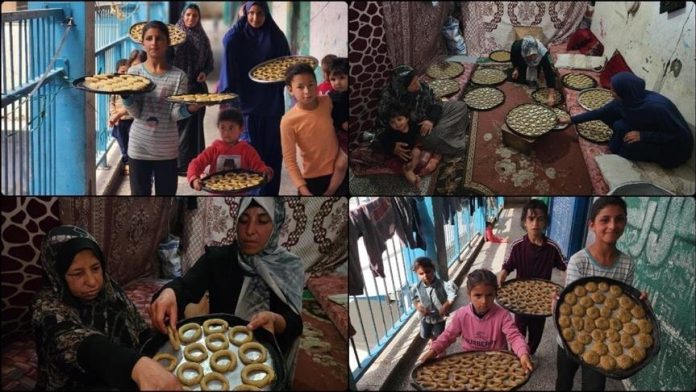Inside a shelter in Khan Younis, southern Gaza, Palestinian women are preparing Kaak, traditional Eid cookies, in hopes of lifting their children’s spirits, despite the ongoing Israeli military offensive that resumed on March 18, 2025, reports Anadolu Agency.
Amid deep grief, destruction, and the loss of homes and loved ones, the women are working to provide their children with even the smallest moments of joy, trying to shield them from the hardship caused by Israel’s continued closure of border crossings. This year, Eid al-Fitr, a festival of breaking the fast at the end of the holy month of Ramadan, arrives in Gaza under severe humanitarian and economic strain, as Israeli attacks intensify. Eid al-Fitr is the first of the two festivals in Islam, the other being Eid al-Adha.
Since March 2, 2025, Israel has enforced a full blockade on the Gaza Strip by shutting all crossings and preventing the entry of humanitarian, medical, and relief aid. Markets are nearly empty, and the cost of remaining goods has surged, making it nearly impossible for Palestinians, impoverished by the war, to meet basic needs.
Last week, the Gaza Government Media Office said the territory has entered the first phase of famine due to the continued blockade and the obstruction of life-saving aid. On March 18, the Israeli army launched a surprise aerial attack on Gaza, killing 896 people and injuring nearly 2,000, effectively ending the ceasefire and prisoner exchange agreement.
Since October 2023, Israeli attacks have killed more than 50,200 Palestinians – mostly women and children – and injured over 114,000, according to health authorities.
The International Criminal Court issued arrest warrants in November for Israeli Prime Minister Benjamin Netanyahu and former Defence Minister Yoav Gallant for war crimes and crimes against humanity in Gaza. Israel is also facing a genocide case at the International Court of Justice over its war on the enclave.




